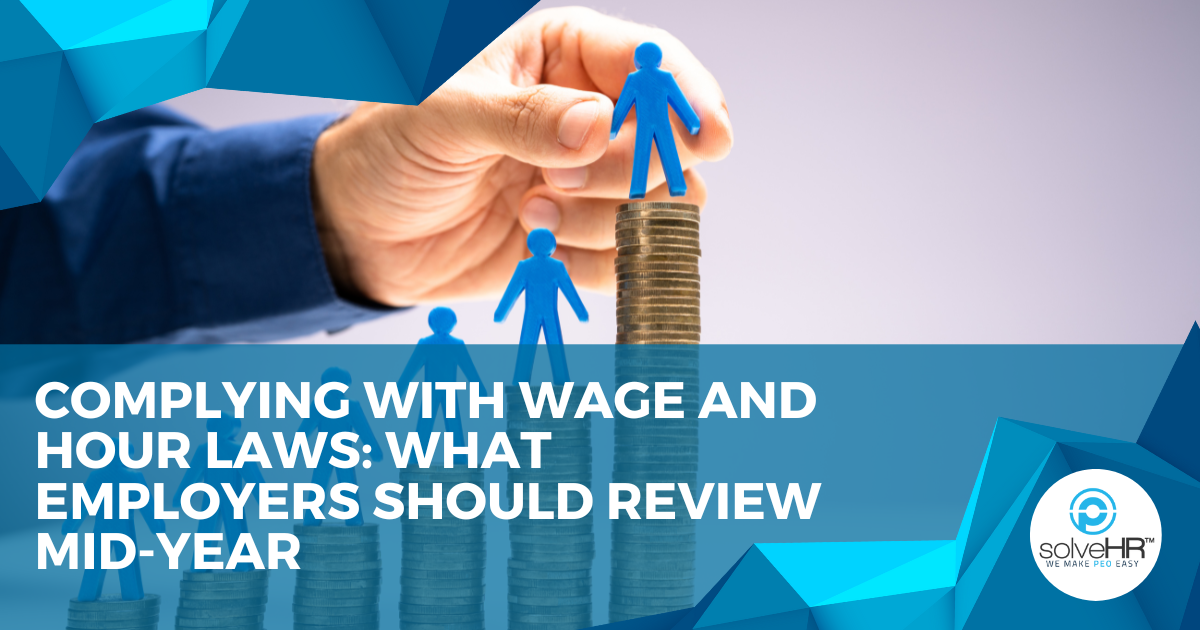Complying with Wage and Hour Laws: What Employers Should Review Mid-Year

Mid-year is an ideal time for employers to review compliance with wage and hour laws, as staying ahead of regulatory changes helps avoid penalties and ensures fair treatment for employees. Wage and hour laws impact nearly every aspect of payroll, from overtime and minimum wage to recordkeeping and meal breaks. At SolveHR, we assist employers with comprehensive mid-year audits to keep wage and hour practices in line with federal, state, and local requirements.
Why Mid-Year Reviews Are Essential
Conducting a mid-year review allows businesses to address any compliance issues before year-end, reducing the risk of costly fines or employee disputes. By proactively identifying potential gaps, businesses can make the necessary adjustments to stay compliant with evolving laws.
Key Areas to Focus on During a Mid-Year Wage and Hour Review
- Minimum Wage and Overtime Compliance
- What to Review: Minimum wage laws vary by state and locality, and some jurisdictions have scheduled mid-year adjustments. Ensure that wages align with the latest requirements and that overtime calculations are accurate.
- SolveHR Tip: Verify that your payroll systems are set up to apply the correct rates, particularly if you operate across multiple locations. SolveHR can help you review and update your payroll practices to reflect mid-year changes in minimum wage and overtime laws.
- Classifying Employees Correctly
- What to Review: Misclassifying employees as exempt (salaried and not eligible for overtime) or non-exempt (hourly and overtime-eligible) can lead to compliance issues. Ensure that roles meet the legal criteria for exempt or non-exempt status.
- SolveHR Tip: Conduct a classification audit to confirm that all employees are properly categorized. SolveHR can provide a detailed analysis of job roles and help reclassify any misclassified positions.
- Ensuring Accurate Timekeeping Practices
- What to Review: Timekeeping errors can lead to wage disputes and back-pay obligations. Ensure that non-exempt employees record all hours worked, including overtime and any required breaks.
- SolveHR Tip: Implement digital time-tracking tools to reduce errors and improve accuracy. SolveHR can recommend solutions that integrate with your payroll system for seamless recordkeeping.
- Reviewing Break and Meal Period Policies
- What to Review: Many states mandate paid or unpaid breaks, and policies may vary based on industry. Verify that your break policies align with state and local regulations, ensuring that employees receive their entitled rest and meal periods.
- SolveHR Tip: Evaluate current policies and practices for break and meal periods. SolveHR can guide you in setting up compliant policies that also minimize workplace disruptions.
- Checking for Compliance with Recordkeeping Requirements
- What to Review: Wage and hour laws often require specific recordkeeping, such as tracking hours worked, wages paid, and time off. Ensure that records are complete, accurate, and stored for the legally required retention period.
- SolveHR Tip: Conduct a records audit to verify that all necessary wage and hour records are properly maintained. SolveHR can provide support for organizing records to meet federal, state, and local regulations.
- Addressing Wage Garnishment and Deductions Properly
- What to Review: Wage garnishment rules vary by state, and there are limits to allowable deductions from employee wages. Make sure deductions comply with the legal limits, and review garnishment processes for accuracy.
- SolveHR Tip: Review payroll systems to ensure accurate application of garnishments and deductions. SolveHR can assist in setting up automated checks to stay compliant with garnishment and deduction rules.
Proactive Steps for Wage and Hour Compliance
- Stay Informed of Legal Updates
- Why It’s Important: Wage and hour laws are subject to change, particularly as more states implement their own requirements. Keeping up with changes ensures ongoing compliance.
- SolveHR Tip: Subscribe to industry newsletters or alerts to stay updated on the latest regulatory changes. SolveHR provides clients with regular updates on wage and hour laws and other HR regulations.
- Conduct Employee Training on Timekeeping and Wage Policies
- Why It’s Important: Training employees, especially managers and supervisors, on timekeeping policies ensures that everyone understands compliance requirements and follows best practices.
- SolveHR Tip: Organize a mid-year refresher course on wage and hour policies, focusing on timekeeping, break policies, and overtime. SolveHR offers customized training sessions to help keep your team informed and compliant.
- Use Technology to Simplify Compliance
- Why It’s Important: Automated timekeeping and payroll systems reduce human error and help ensure accurate recordkeeping and wage calculations.
- SolveHR Tip: Consider integrating technology solutions that support compliance with wage and hour laws. SolveHR can recommend systems that align with your business needs and streamline compliance.
- Perform Regular Audits of Payroll Practices
- Why It’s Important: Regular payroll audits help identify any discrepancies in wage payments and overtime calculations, ensuring employees are compensated fairly and accurately.
- SolveHR Tip: Schedule bi-annual audits of your payroll system to catch and address issues early. SolveHR can conduct a thorough review of your payroll practices and assist with adjustments where needed.
How SolveHR Can Support Your Wage and Hour Compliance Efforts
At SolveHR, we provide clients with the resources and guidance needed to navigate complex wage and hour laws. Our team helps businesses with mid-year compliance audits, policy reviews, and training, ensuring that your practices meet federal, state, and local regulations. With our support, you can focus on growing your business while we handle the details of wage and hour compliance.Wage and hour compliance is essential to maintaining fair and lawful treatment of employees while avoiding costly penalties. By conducting a mid-year review, businesses can identify and address potential compliance issues before they escalate. Contact SolveHR today to discuss how we can help you streamline your wage and hour practices and stay compliant with the latest regulations.
Experience Hassle-Free Payroll Today
Request a demo to see our services in action!

